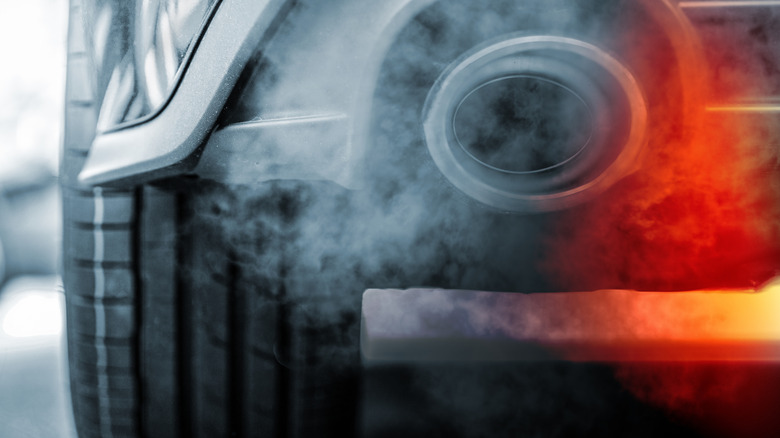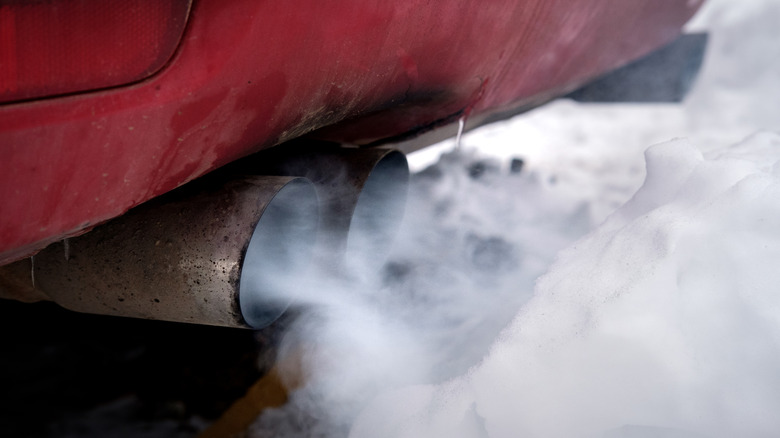If Your Diesel Exhaust Smells Sweet, This Is Probably Why
Like all engines, the exhaust fumes from a diesel-fueled variety have their own distinctive smell. Usually, a healthy diesel engine will smell of burnt diesel fuel and nothing else. However, if you detect a sweet smell coming from your diesel exhaust, then it's very likely a symptom pointing to an underlying problem. More specifically, the most common cause of a sweet scent from diesel exhaust is that coolant fluid is burned during the combustion process. The smell may not be the only clue either, as this problem also causes exhaust fumes to become whiter (usually in the first three minutes after starting the car from cold.) It's worth noting that white smoke from diesel exhaust can also be symptomatic of an oil leak. This is why understanding why diesel exhaust fumes smell sweet is important, it can help to diagnose an engine problem quickly and potentially save a lot of money by remedying the problem before too much damage is done.
As noted, the sweet smell from the exhaust is usually a sign of a coolant leak. There are two common types of coolant these are ethylene glycol and propylene glycol. When you consider that ethylene glycol is two and half times as sweet as sugar you can begin to understand why a coolant leak can leave your exhaust smelling like the inside of a candy shop. Let's take a closer look at the underlying reasons behind a sweet-smelling diesel exhaust.
Signs your diesel engine is burning coolant
Catching a coolant leak early is critical to avoid severe engine damage. Insufficient coolant levels can cause engine overheating, but simply topping this up is no more than using a band-aid to cover an underlying problem. The most common cause of a coolant leak where the fluid finds its way into the combustion chambers is a blown or leaking head gasket, (more about this later) and this is something that should always be addressed as a matter of priority.
Apart from a sweet smell, there are some other signs that can diagnose a coolant leak. We touched on white smoke, although this could have other underlying causes, so a little further investigation can help to identify the root of the problem. Simply, checking the level of the coolant is the easiest way to begin. Check the owner's handbook to find out where the coolant tank is and check that the coolant is between the min and max marks. If you have to remove the coolant tank lid, always do it when the engine is cold as the coolant can still be pressurized. Checking under the vehicle for visible signs of a coolant leak is also useful. However, there may not be external signs of this as internal leaks can make it look like your car is losing coolant without a leak.
Common causes of coolant leaks
For a coolant leak to cause a sweet smell, it must leak in such a way that the coolant finds its way into the combustion chamber. This narrows down the problem area. While there can be other reasons, like a damaged manifold or cracked cylinder head, by far the most common cause is a blown or leaking head gasket. This is one of the most important seals in the entire engine, acting as a barrier between the cooling system and the combustion system. When this fails, the sugary-sweet coolant is combusted with the fuel, resulting in the smell and possibly white exhaust smoke.
There are several ways to check if your head gasket has blown. One of the most common signs is fluctuating engine temperatures, so the temperature gauge on the dashboard should be closely monitored. Another sign is bubbling coolant either in the radiator or the coolant tank. This signifies that not only is coolant leaking into the combustion chamber, but exhaust gases are escaping into the cooling system. Oil and diesel can also follow this path, and this can give the coolant a "milky look". This is also another pointer that can signify the head gasket is the culprit. Similarly, check your dipstick to see if the oil is frothy or has signs of engine sludge. Finally, a compression test or other checks carried out by a professional mechanic is highly recommended to precisely diagnose the issue. Unfortunately, a blown head gasket is not something that can be "sugar-coated" — it's a serious and often expensive issue.


